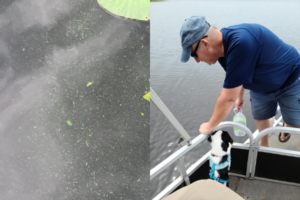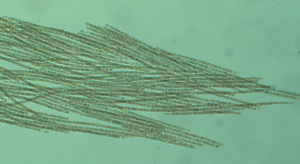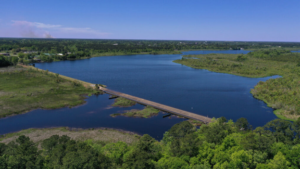
A blue-green algae (cyanobacteria) bloom was detected in a reservoir used as a back-up drinking water source for the City of Charleston, SC. NCCOS sampling, training and support allowed state officials to quickly evaluate the threat of cyanobacterial toxins in the reservoir. State health officials found no toxins after testing the water.
On Friday April 9, 2021, the Charleston Water System contacted the South Carolina Task Group on Harmful Algae regarding an algal bloom occurring in the Goose Creek Reservoir, one of the drinking water sources for the Greater Charleston, SC area.
Researchers with the NCCOS HAB Monitoring and Reference Branch at the NOAA Charleston Laboratory positively identified the bloom cyanobacteria as Aphanizomenon flos-aquae, a known producer of the toxins saxitoxin and microcystin, as responsible for the bloom. South Carolina Department Health and Environmental Control (SCDHEC) released an advisory cautioning those participating in recreational activities on the Goose Creek Reservoir due to high levels of cyanobacteria. A survey of the reservoir conducted by NCCOS found the bloom extended through the entire 600 acres of the reservoir.
Applying NCCOS detection methods and training, SCDHEC determined that saxitoxin or microcystin were not detected in this bloom. Numerous local press reported on the initial advisory and subsequent lack of toxins. The response effort to the bloom will be examined by the Task Group.


